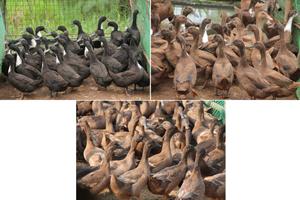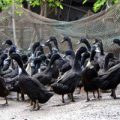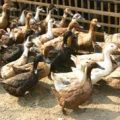A genetically superior breeder duck called itik Pinas (IP) was developed in a project conducted by the Philippine Council for Agriculture, Aquatic and Natural Resources Research and Development of the Department of Science and Technology (DOST-PCAARRD) and the National Swine and Poultry Research and Development Center of the Bureau of Animal Industry (BAI-NSPRDC). IP was a product of continuous selection and breeding of the traditional Pateros duck.

IP is an offshoot of DOST-PCAARRD’s Industry Strategic S&T Program (ISP) on Duck, which aims to address the low and inconsistent egg production performance and product quality of the “mongrel” ducks as an effect of long term indiscriminate breeding practices of the duck industry.
Compared with traditional ducks, IP produces more eggs of up to 55 pieces per duck per year over that of the traditional mongrel ducks. IP eggs is also consistent in terms of egg weight with at least 80% of egg produced weigh 65 grams or more.
IP has three strains – two of which are purelines known as IP-Itim and IP-Khaki and one commercial hybrid line, IP-Kayumanggi.
In regions 3 and 4A where IP was introduced, average egg production increased from 55-70%. Consistency in egg quality in terms of weight (65g) was also recorded. Moreover, the project also observed sexual dimorphism in terms of plumage color in IP-Kayumanggi ducklings. This condition is advantageous to duck breeders as they eliminate sex identification at day-old (vent sexing), in effect, it reduces the cost of labor and day old duckling mortality.
To date, there are five committed private entrepreneurs engaged in the production, multiplication and distribution on pre-arranged transactions of Itik Pinas from Quezon, Laguna, Batangas, and Nueva Ecija together with BAI-NSPRDC.
In support to the development of IP, a project on feeds and feeding systems to establish the nutrient requirement and suggested feed formulation for starter, grower, and layer is being conducted. Moreover, IP performance testing in Regions 2, 3, 4A, 6, 9, 11, and 12 and development of product standards for balut and salted eggs are all geared up this 2017.
The IP implementing partners include BAI-NSPRDC, Central Luzon State University (CLSU), University of the Philippines Los Baños (UPLB), Isabela State University (ISU), West Visayas State University (WVSU), Western Mindanao State University (WMSU), DA- RFO XI (Davao), Sultan Kudarat State University (SKSU), University of Santo Tomas (UST).
by Alfredo Ryenel M. Parungao, DOST-PCAARRD S&T Media Service






